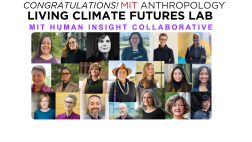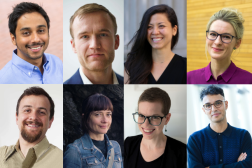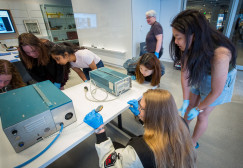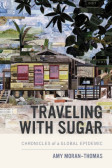Biography
Amy Moran-Thomas is Associate Professor of Anthropology at MIT. Her ethnographic research focuses on how health technologies and ecologies are designed and come to be materially embodied—often inequitably—by people in their ordinary lives. Prof. Moran-Thomas received her Ph.D. in Anthropology from Princeton University in 2012. Her writings have appeared in publications such as New England Journal of Medicine and Wired. Her first book, Traveling with Sugar: Chronicles of a Global Epidemic (University of California Press, 2019), offers an anthropological account of diabetes care technologies in use and the lives they shape in global perspective. The book received an award from the caregivers in Belize whose work it describes, as well as the Victor Turner Prize for Ethnographic Writing and the Wellcome Medal for Anthropology as Applied to Medical Problems. In 2024-26, Moran-Thomas is co-leading a climate and health humanities project funded by an ACLS Digital Seed Grant, “Sugar Atlas: Counter-Mapping Diabetes from the Caribbean,” together with co-PIs Prof. Tonya Haynes and Prof. Nicole Charles. Also working on a book about embodied histories of energy, Prof. Moran-Thomas is interested in how social perspectives on design can contribute to producing fairer health technologies. More broadly, her research explores the material culture of chronic conditions; embodied aspects of planetary health; intergenerational dilemmas of responsibility; and writing public anthropology.
Research
Health Between Generations
Professor Moran-Thomas’ first book, Traveling with Sugar: Chronicles of a Global Epidemic (2019; open access here), traces the planetary diabetes epidemic as part of the ongoing legacies of sweetness and power. It chronicles five hundred years of sugar’s histories, and follows the care work of families managing chronic conditions and their struggles to recover from diabetic injuries such as organ failure and amputated limbs — health advocacy movements followed in relation to the material afterlives of sugar plantations in the Caribbean and Central America. The book’s storytelling structure of crónicas follows patients’ travails and "slow care" as they navigate unequal global infrastructures and unsettling dilemmas. The stories and routines they shared help to show diabetes’ tasks of maintenance and repair as entwined issues of caring for bodies, technologies, histories, data, infrastructures, ancestors, atmospheres, and ecosystems.
Building on this work about the social lives of carbohydrates (especially sugar), Professor Moran-Thomas is also working on a project about embodied aspects of hydrocarbons (especially mining in west Pennsylvania.) It again draws on kinship as critical method — this time writing from her own families’ histories, with an excerpt appearing in the upcoming volume Scholars and Their Kin. In its civic technoscience aspects, this wider research also involves launching a community-guided underground safety mapping project— a new collaboration between Anthropology and Earth, Atmospheric, and Planetary Sciences to study small local earthquakes and their potential health implications— supported by the ESI Climate Justice Program and the Center for Coalfield Justice.
As part of her work on health between generations, Professor Moran-Thomas is also co-leading collective work to reexamine the ongoing legacies and implications of unethical medical experiments conducted by U.S. physicians in Guatemala. In 2024-25, this writing and research is being supported by a SHASS Dean’s Grant.
Social Lives of Medical Objects
Prof. Moran-Thomas’ work often combines ethnography and cultural history to examine the social lives of health objects. She has written about global breakdowns of glucose meters and the problem of equitable design; lives shaped by various types of insulin, which remain inaccessible to many on its hundredth anniversary; and struggles to maintain bodies and infrastructures through use of dialysis devices, oxygen chambers for diabetic wound care, and prosthetic limbs. During the Covid-19 pandemic, she extended these material questions to explore the forgotten history of more equitable oximeters. Her essay on unequal inaccuracies in pulse oximeters in Boston Review prompted the first clinical study of the problem using hospital data, now part of worldwide calls to create fairer “wearable” devices. Co-designing teaching materials on the subject and serving on the National Academy of Sciences' Committee on the Use of Race and Ethnicity in Biomedical Research, Prof. Moran-Thomas is interested in how social perspectives on design can contribute to producing more equitable health technologies.
Selected Publications
| 2024 | (with Susan Reverby). On the Appearance and Disappearance of Difficult Histories: What Does it Take to Sustain Public Memory? American Journal of Public Health, 114 (6): 564-68. |
| 2023 | Sweetness Across Thresholds at the Edge of the Sea.in Eating beside Ourselves: Thresholds of Foods and Bodies. Heather Paxson, ed. Durham, NC: Duke University Press. |
| 2021 | One Hundred Years of Insulin for Some. New England Journal of Medicine 385(4), 293-5. July 22 2021. |
| 2021 | Notes from a Fever Dream. Special Issue "Where Do We Go From Here?" Edited by Lucas Bessire. Anthropology Now, 13: 11-24. (Video from reading at Harvard Friday Morning Seminar here.) |
| 2021 | Oximeters Used to Be Designed for Equity. What Happened? Wired, June 4 2021. |
| 2020 | How a Popular Medical Device Encodes Racial Bias. Boston Review. August 2020. (Book version here.) |
| 2019 | Traveling with Sugar: Chronicles of a Global Epidemic. Berkley: University of California Press. (Book PDF open access here.) |
| 2019 | What is Communicable? Unaccounted Injuries and 'Catching' Diabetes in an Illegible Epidemic. Cultural Anthropology 34(4), 503-528. |
| 2019 | Struggles for Maintenance: Patient Activism and Dialysis Dilemmas. Special Issue on “Social Inequities and Contemporary Struggles for Collective Health in Latin America.” Edited by Emily Vasquez, Amaya Perez-Brumer, and Richard Parker. Global Public Health 14 (6-7), 1044-57. |
| 2017 | Glucometer Foils. Special issue on "Little Development Devices/ Humanitarian Goods." Edited by Peter Redfield and Alice Street. Limm, Issue 9. |
| 2016 | Breakthroughs for Whom?: Global Diabetes Care and Equitable Design. New England Journal of Medicine 375; 24: 2317-9. |
| 2016 | I Didn't Bring My Camera. On Hervé Guibert's Cytomegalovirus: A Hospitalization Diary. Edited by Eugene Raikhel. Somatosphere. |
| 2012 | Witchcraft, Oracles and Magic in a Disease Eradication Program. In When People Came First: Critical Studies in Global Health. Edited by Joao Biehl and Adriana Petryna. Princeton: Princeton University Press. |
| 2009 | Symptom: Subjectivities, Social Ills, Technologies. Annual Review of Anthropology 38: 267-88 (with Joao Biehl). |
Teaching
21A.00
Introduction to Anthropology: Comparing Human Cultures
Through the comparative study of different cultures, anthropology explores fundamental questions about what it means to be human. Seeks to understand how culture shapes societies, from the smallest island in the South Pacific to the largest Asian metropolis, and affects the way institutions work, from scientific laboratories to Christian mega-churches. Provides a framework for analyzing diverse facets of human experience, such as gender, ethnicity, language, politics, economics, and art.
21A.301
Disease and Health: Culture, Society, and Ethics
From a cross cultural and global perspective, examines how medicine is practiced, with particular emphasis on biomedicine. Analyzes medical practice as a cultural system, focusing on the human and social side of things. Considers how people in different societies think of disease, health, body, and mind.
21A.305
Drugs, Politics, and Culture
Explores the relationship between drugs and society in a cross-cultural perspective, looking at intersections between drugs and phenomena such as poverty, religion, technology, colonialism, conflict, and global capitalism. Examines histories behind the use and abuse of various substances, including opium, cocaine, and prescription pharmaceuticals. Considers why different societies prohibit and sanction different drugs; the politics of markets and clinical trials; and how social conditions affect the circulation of medicines in global health.
21A.311
The Social Lives of Medical Objects
Explores the theories and assumptions built into objects meant to improve health. Students read and discuss case studies that follow the often unexpected ways intended intervention objects are designed and developed, globally travel, and at times become part of people's everyday lives. Studies include a broad range of medical materials and development technologies, such as penicillin, anti-malarial drugs, water pumps, air filters, prosthetic limbs, glucose meters, scales, DDT insecticides, bednets, and micro-nutrient pills.
21A.312
Planetary Change and Human Health
Explores intersections between health of the planet and the health of human beings. Drawing upon case studies of growing ecological crisis around the world, topics include the societal and human health implications of global climate change, sea level rise, weather disasters and fossil fuel pollution; connections between the health of plants, animals, microbes, and people; shifting industrial food systems and human nutrition; representations of race and indigeneity amid struggles for environmental justice; waste disposal and nuclear afterlives; and debates surrounding controversial issues such as geoengineering and climate AI. Students will practice inserting environmental sciences in dialogue with toolkits from the social sciences and humanities to explore the uneven social worlds that shape how science gets traction (or not) in policy and law.
21A.319J/STS.330J
History and Anthropology of Medicine and Biology
Explores recent historical and anthropological approaches to the study of medicine and biology. Topics might include interaction of disease and society; science, colonialism, and international health; impact of new technologies on medicine and the life sciences; neuroscience and psychiatry; race, biology and medicine. Specific emphasis varies from year to year.
21A.404
Living Through Climate Change
Uses anthropological approaches to better understand those social and political forces shaping climate change as well as proposed solutions, including those leveraging technical and scientific tools. Examines how climate change is bound up, historically and today, with other processes — including land dispossession, pollution, resource insecurity, industrial agriculture, eroding infrastructure, racial housing discrimination, and job loss. Explores perspectives on social justice, community engagement, and lived experiences of climate change – and their implications for science, engineering, and industry. Engages ethnographic case studies that address unequal climate impacts, the effects of policy, and ongoing mitigation efforts unfolding in agriculture, coastal engineering, architecture, urban planning, global migration, and historical repair. Includes field trips during class time.
21A.500J/STS.075J
Technology and Culture
Examines the intersections of technology, culture, and politics in a variety of social and historical settings ranging from 19th-century factories to 21st-century techno dance floors, from Victorian London to anything-goes Las Vegas. Discussions and readings organized around three questions: what cultural effects and risks follow from treating biology as technology; how computers have changed the way we think about ourselves and others; and how politics are built into our infrastructures. Explores the forces behind technological and cultural change; how technological and cutural artifacts are understood and used by different communities; and whether, in what ways, and for whom technology has produced a better world.
21A.508
Culture and Ethics in Science Fiction Worlds
Examines the ethical and controversial aspects of technology's impacts on society, as approached through the lens of science fiction and media. From novels such as Kindred to films like Sleep Dealer, the social inequalities and political complexities portrayed in science fiction worlds offer a launch point to discuss the uneasy aspects and uneven reach of science, technology, and medicine. Covers issues including gene editing, data privacy, border surveillance, human experimentation, environmental crises, war industries, and the impacts of AI.
21A.829J/STS.360J
Ethnography
Practicum style course introduces students to ethnographic methods and writing in global health research. Organized around interviewing and observational assignments. Students develop a bibliography of anthropological and ethnographic writing relevant to their project, and write a short paper about integrating ethnographic methods into a future research project. Preference to HASTS students; open to others with permission of instructor.
Awards
| 2023 | Wellcome Medal for Anthropology as Applied to Medical Problems |
| 2022 | Harold E. Edgerton Faculty Achievement Award, President and Faculty of MIT |
| 2021 | Victor Turner Prize in Ethnographic Writing, Society for Humanistic Anthropology |
| 2021 | SLACA Annual Book Prize, Society for Latin American and Caribbean Anthropology |
| 2021 | Foundation for the Sociology of Health & Illness Book Prize, British Sociological Association |
| 2020 | James A. and Ruth Levitan Research Prize in the Humanities |
| 2019 | Diabetes Foot Center Group Appreciation Award |
| 2014 | Curl Essay Prize, Royal Anthropological Institute |
| 2011 | David Schneider Award, American Anthropological Association |
| 2011 | Elise Clews Parsons Prize, American Ethnological Society |
| 2011 | Rudolf Virchow Award, Critical Anthropology of Global Health Group |
| 2011 | Science, Technology & Medicine Interest Group SMA Paper Prize |
| 2008 | Christine Wilson Prize, Society for the Anthropology of Food & Nutrition |
News
Living Climate Futures Lab awarded inaugural MITHIC Faculty-Driven Initiative Seed Grant
MITHIC Staff
May 21, 2025
Meet the 2024 tenured professors in the MIT School of Humanities, Arts, and Social Sciences
School of Humanities, Arts, and Social Sciences | MIT News
September 10, 2024
Exploring the Unexpected Social Questions Behind Everyday Medical Devices
Danna Lorch | MIT News
June 8, 2023
Amy Moran-Thomas receives the Edgerton Faculty Achievement Award
Story prepared by MIT SHASS Communications | Senior Writer: Kathryn O'Neill | Editorial and Design Director: Emily Hiestand
April 26, 2022
Oximeters Used to Be Designed for Equity. What Happened?
Amy Moran-Thomas | WIRED Magazine | Image Credit: Amy Moran-Thomas
June 8, 2021
Amy Moran-Thomas "On planetary change and human health"
SHASS News | Image: Hurricane Hattie Belize, by Delvin "Pen" Cayetano, 1996, Oil on Canvas
December 8, 2020







